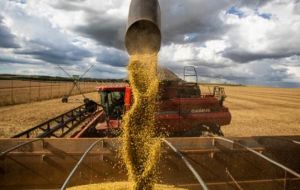MercoPress. South Atlantic News Agency
Slower Chinese demand impacts on Brazilian soybeans sales and beef prices
 China soybeans imports fell 19% in October from a year earlier to 4.14 million tons. Customs shows lesser purchases amid high global prices and poor crush margins.
China soybeans imports fell 19% in October from a year earlier to 4.14 million tons. Customs shows lesser purchases amid high global prices and poor crush margins. The Chinese economy is slowing down, the Yuan is weaker against the US dollar and Beijing is insisting with complete lockdowns in many cities because of Covid 19 or respiratory diseases, reducing considerably activity and consumption.
Soybeans imports fell 19% in October from a year earlier to 4.14 million tons, Customs 0data showed in China, representing their lowest for any month since 2014, after buyers cut purchases amid high global prices and poor crush margins.
Imports by the world’s top buyer of the oilseed were 73.18 million tons for the first 10 months of the year, down 7.4% from last year, data from the General Administration of Customs showed. The very low shipments, matching the October 2014 figure of 4.1 million tons, underline an urgent need to rebuild stockpiles.
“Crush margins have been bad most of this year which has weighed on imports,” said Darin Friedrichs, co-founder of Shanghai-based consultancy Sitonia Consulting. Global soybean prices hit a decade-high in June as bad weather cut production in Brazil, China’s top supplier.
The high prices and lackluster demand for animal feed from the livestock sector during the first half of the year eroded crushing profits, blunting appetite for soybean purchases over the summer. Crush margins in the soybean crushing hub of Rizhao were negative from late April until October.
The October arrivals were, however, even lower than the 5 million tons that traders and analysts had predicted last month.
The situation has left China short of supplies now that hog profits have recovered and boosted demand for the key protein ingredient, soymeal. Soybeans are crushed to make soymeal for animals and oil for cooking.
Cash soymeal prices touched records in recent weeks on tight supply. In the top hog-raising province of Sichuan, prices reached 5,850 yuan (US$ 810.78) a ton last week, up 26% in two months.
“Imports should pick up in November and December, but for right now, the market faces a very tight soybean supply situation,” said Sitonia Consulting’s Friedrichs.
Meanwhile reflecting the same conditions, average prices for beef exported by Brazil fell in the second part of the year, partially in response to the renegotiation of contracts with importers. According to data from the country’s Department of Foreign Trade compiled by consultancy Safras & Mercado, the price per ton peaked at BR0L 6,800 in June. In October, the average price dropped to BRL 5,900.
The country exported 152.6 thousand tons of beef (fresh, refrigerated, or frozen) in June when revenue reached R$ 1.4 billion. However last month, the data pointed to the shipment of 188.6 thousand tonnes and earnings of R$ 1.1 billion.
“This [trend] reflects the concern over lockdowns in China, but also toward the devaluation of the Chinese Yuan against the dollar, which weakens purchasing power at the largest importer of Brazilian animal protein,” said Fernando Iglesias, an analyst at Safras & Mercado to the press services Valor.
China, he claims, will import less Brazilian beef next year because the country will produce 400 thousand additional tons of this protein. “The Chinese are increasing their production to reduce their reliance on imports, a trend that has already been observed with pork and chicken. As a result, the country’s purchases will be lower than in 2022,” he predicts.
Iglesias also notes that Brazilian meatpackers are preparing themselves to deal with international trends by “strongly lowering the price of live cattle in the interior of Brazil.” Valor asked the three most prominent companies in the animal protein market in the country – JBS, Marfrig, and Minerva – for a comment, which they did not offer because they find themselves in the period of silence that precedes the publication of quarterly results or because they cannot comment on market strategies.
Analysts Thiago Duarte and Henrique Brustolin from BTG Pactual included in a report that the deceleration of beef prices follows the entry of the livestock cycle in a scenario of increased supply. But, with the growth in the volume of shipments, they believe that the fourth quarter will be more advantageous for Brazilian meatpackers.
“It is expected that animal supplies will continue to grow while demand from abroad will remain high. Therefore, the major Brazilian beef players appear well positioned to present stronger results beginning in the second half of this year,” they concluded.




Top Comments
Disclaimer & comment rulesCommenting for this story is now closed.
If you have a Facebook account, become a fan and comment on our Facebook Page!